Unit 187: Operations and Project Management - Tesco Case Study
VerifiedAdded on 2023/06/07
|18
|4887
|141
Report
AI Summary
This report provides a comprehensive review and critique of Tesco's operations management, examining the implementation of operations management principles within the organization and analyzing the extent to which these practices meet the company's requirements. It discusses continuous improvement as a philosophy, describes Lean principles, and presents a continuous improvement plan with justified recommendations for improvement based on the review and critique. The report covers various aspects of Tesco's operations, including pricing strategies, marketing elements, online presence, gifting strategies, customer service, recruitment processes, and analytical teams. It also addresses the principles of operations management, such as reality, humility, organization, accountability, change, quality control, success, competitor awareness, causality, consumer collaboration, and Taylor's theory of scientific management. Furthermore, the report analyzes how Tesco's operations management aligns with its revenue, operational, productivity, customer satisfaction, and growth objectives, emphasizing the importance of product design, forecasting, supply chain management, and delivery management in achieving organizational success. The continuous improvement plan focuses on cost reduction and efficiency through Kaizen principles, aiming to enhance overall operational performance.
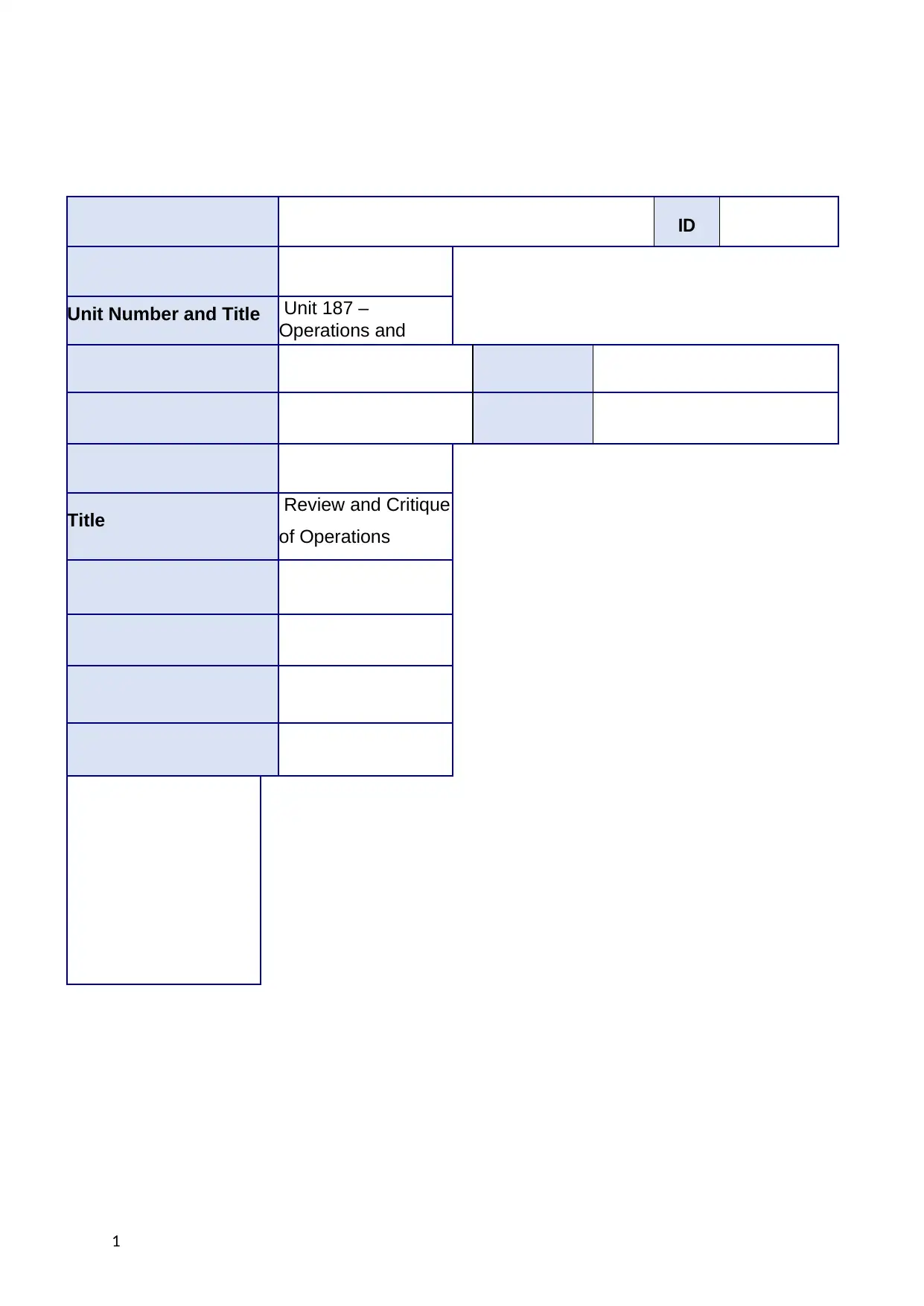
ID
Unit Number and Title Unit 187 –
Operations and
Project Management
Title Review and Critique
of Operations
Management (Part
1
Unit Number and Title Unit 187 –
Operations and
Project Management
Title Review and Critique
of Operations
Management (Part
1
Paraphrase This Document
Need a fresh take? Get an instant paraphrase of this document with our AI Paraphraser
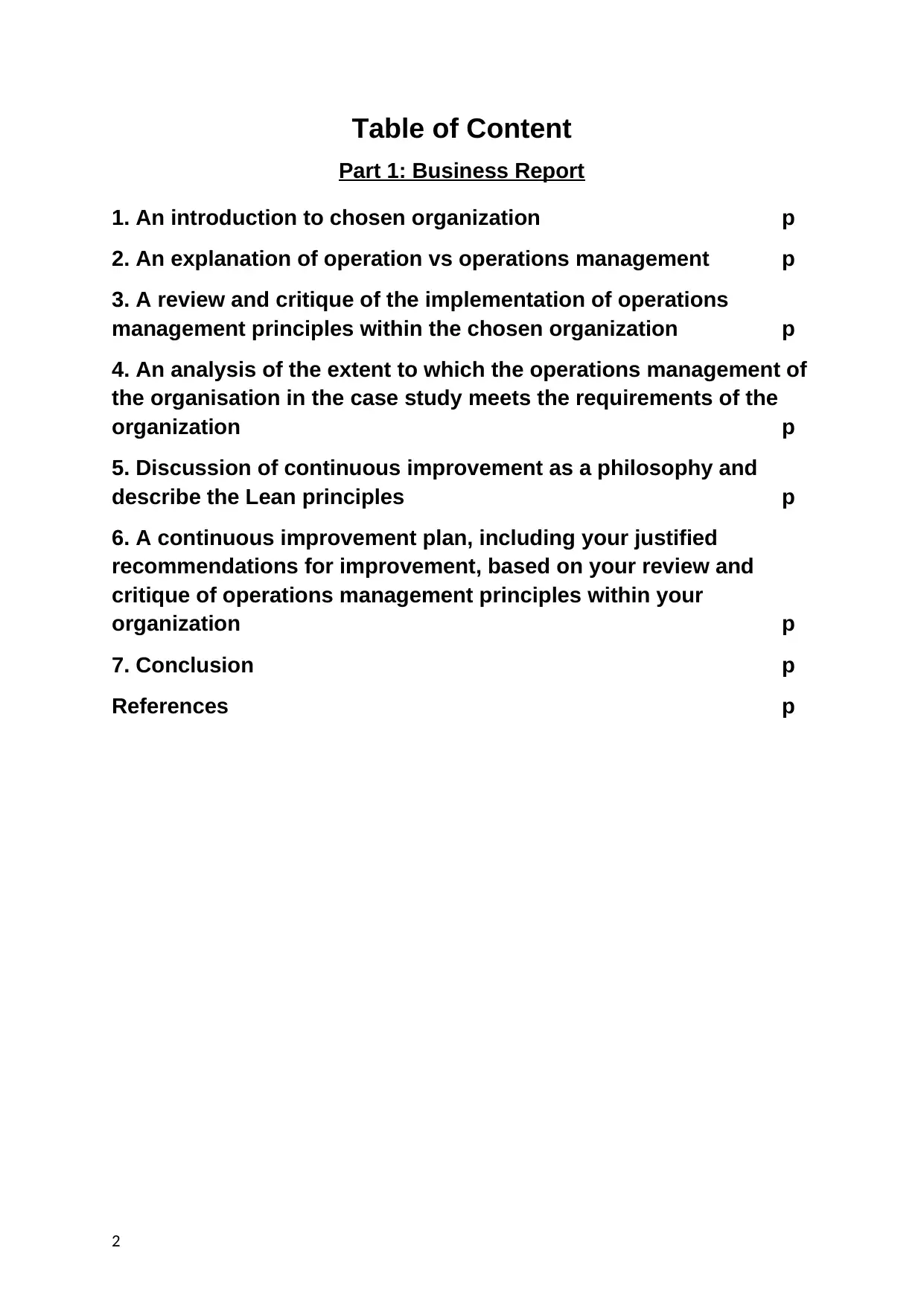
Table of Content
Part 1: Business Report
1. An introduction to chosen organization p
2. An explanation of operation vs operations management p
3. A review and critique of the implementation of operations
management principles within the chosen organization p
4. An analysis of the extent to which the operations management of
the organisation in the case study meets the requirements of the
organization p
5. Discussion of continuous improvement as a philosophy and
describe the Lean principles p
6. A continuous improvement plan, including your justified
recommendations for improvement, based on your review and
critique of operations management principles within your
organization p
7. Conclusion p
References p
2
Part 1: Business Report
1. An introduction to chosen organization p
2. An explanation of operation vs operations management p
3. A review and critique of the implementation of operations
management principles within the chosen organization p
4. An analysis of the extent to which the operations management of
the organisation in the case study meets the requirements of the
organization p
5. Discussion of continuous improvement as a philosophy and
describe the Lean principles p
6. A continuous improvement plan, including your justified
recommendations for improvement, based on your review and
critique of operations management principles within your
organization p
7. Conclusion p
References p
2
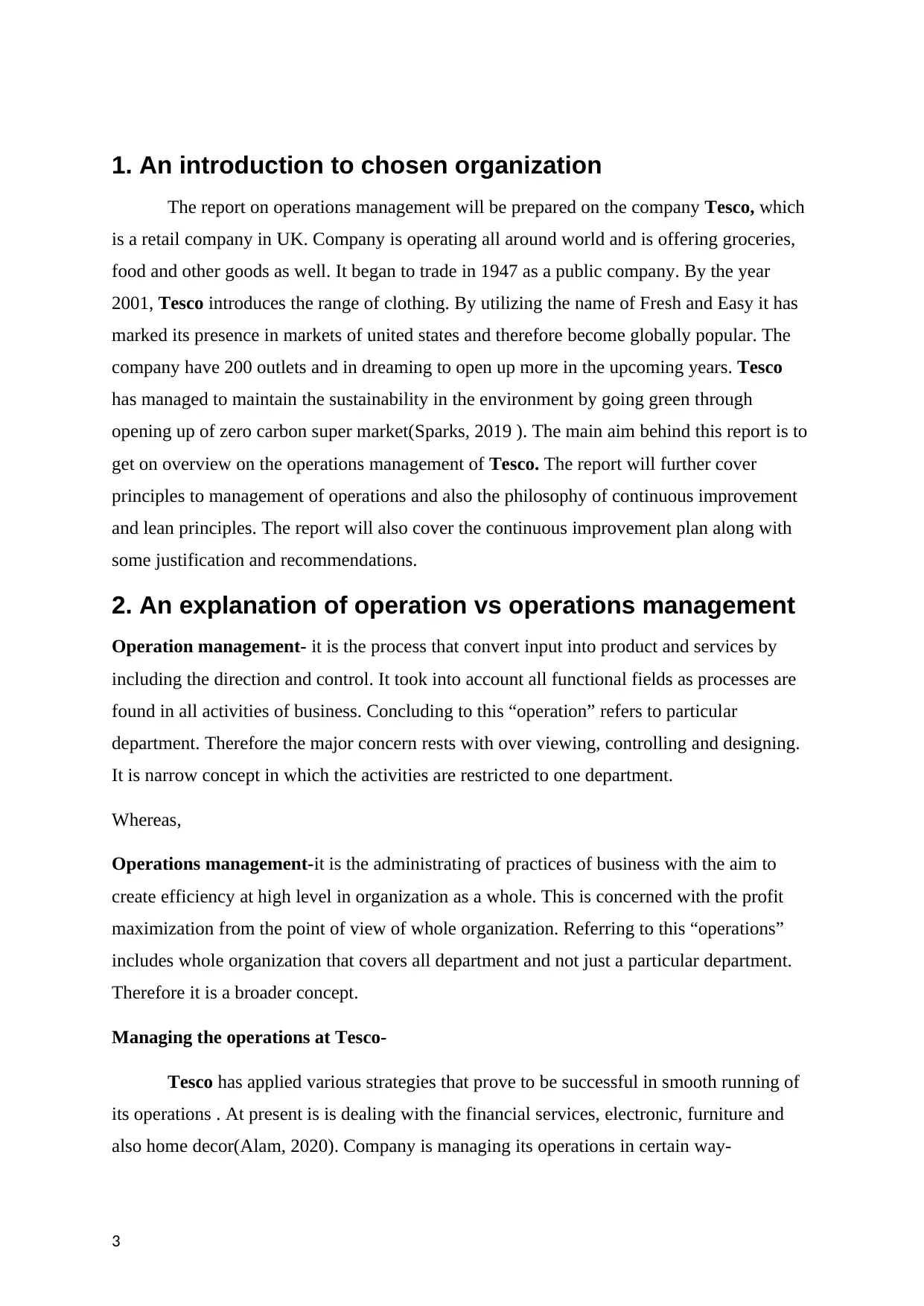
1. An introduction to chosen organization
The report on operations management will be prepared on the company Tesco, which
is a retail company in UK. Company is operating all around world and is offering groceries,
food and other goods as well. It began to trade in 1947 as a public company. By the year
2001, Tesco introduces the range of clothing. By utilizing the name of Fresh and Easy it has
marked its presence in markets of united states and therefore become globally popular. The
company have 200 outlets and in dreaming to open up more in the upcoming years. Tesco
has managed to maintain the sustainability in the environment by going green through
opening up of zero carbon super market(Sparks, 2019 ). The main aim behind this report is to
get on overview on the operations management of Tesco. The report will further cover
principles to management of operations and also the philosophy of continuous improvement
and lean principles. The report will also cover the continuous improvement plan along with
some justification and recommendations.
2. An explanation of operation vs operations management
Operation management- it is the process that convert input into product and services by
including the direction and control. It took into account all functional fields as processes are
found in all activities of business. Concluding to this “operation” refers to particular
department. Therefore the major concern rests with over viewing, controlling and designing.
It is narrow concept in which the activities are restricted to one department.
Whereas,
Operations management-it is the administrating of practices of business with the aim to
create efficiency at high level in organization as a whole. This is concerned with the profit
maximization from the point of view of whole organization. Referring to this “operations”
includes whole organization that covers all department and not just a particular department.
Therefore it is a broader concept.
Managing the operations at Tesco-
Tesco has applied various strategies that prove to be successful in smooth running of
its operations . At present is is dealing with the financial services, electronic, furniture and
also home decor(Alam, 2020). Company is managing its operations in certain way-
3
The report on operations management will be prepared on the company Tesco, which
is a retail company in UK. Company is operating all around world and is offering groceries,
food and other goods as well. It began to trade in 1947 as a public company. By the year
2001, Tesco introduces the range of clothing. By utilizing the name of Fresh and Easy it has
marked its presence in markets of united states and therefore become globally popular. The
company have 200 outlets and in dreaming to open up more in the upcoming years. Tesco
has managed to maintain the sustainability in the environment by going green through
opening up of zero carbon super market(Sparks, 2019 ). The main aim behind this report is to
get on overview on the operations management of Tesco. The report will further cover
principles to management of operations and also the philosophy of continuous improvement
and lean principles. The report will also cover the continuous improvement plan along with
some justification and recommendations.
2. An explanation of operation vs operations management
Operation management- it is the process that convert input into product and services by
including the direction and control. It took into account all functional fields as processes are
found in all activities of business. Concluding to this “operation” refers to particular
department. Therefore the major concern rests with over viewing, controlling and designing.
It is narrow concept in which the activities are restricted to one department.
Whereas,
Operations management-it is the administrating of practices of business with the aim to
create efficiency at high level in organization as a whole. This is concerned with the profit
maximization from the point of view of whole organization. Referring to this “operations”
includes whole organization that covers all department and not just a particular department.
Therefore it is a broader concept.
Managing the operations at Tesco-
Tesco has applied various strategies that prove to be successful in smooth running of
its operations . At present is is dealing with the financial services, electronic, furniture and
also home decor(Alam, 2020). Company is managing its operations in certain way-
3
⊘ This is a preview!⊘
Do you want full access?
Subscribe today to unlock all pages.

Trusted by 1+ million students worldwide
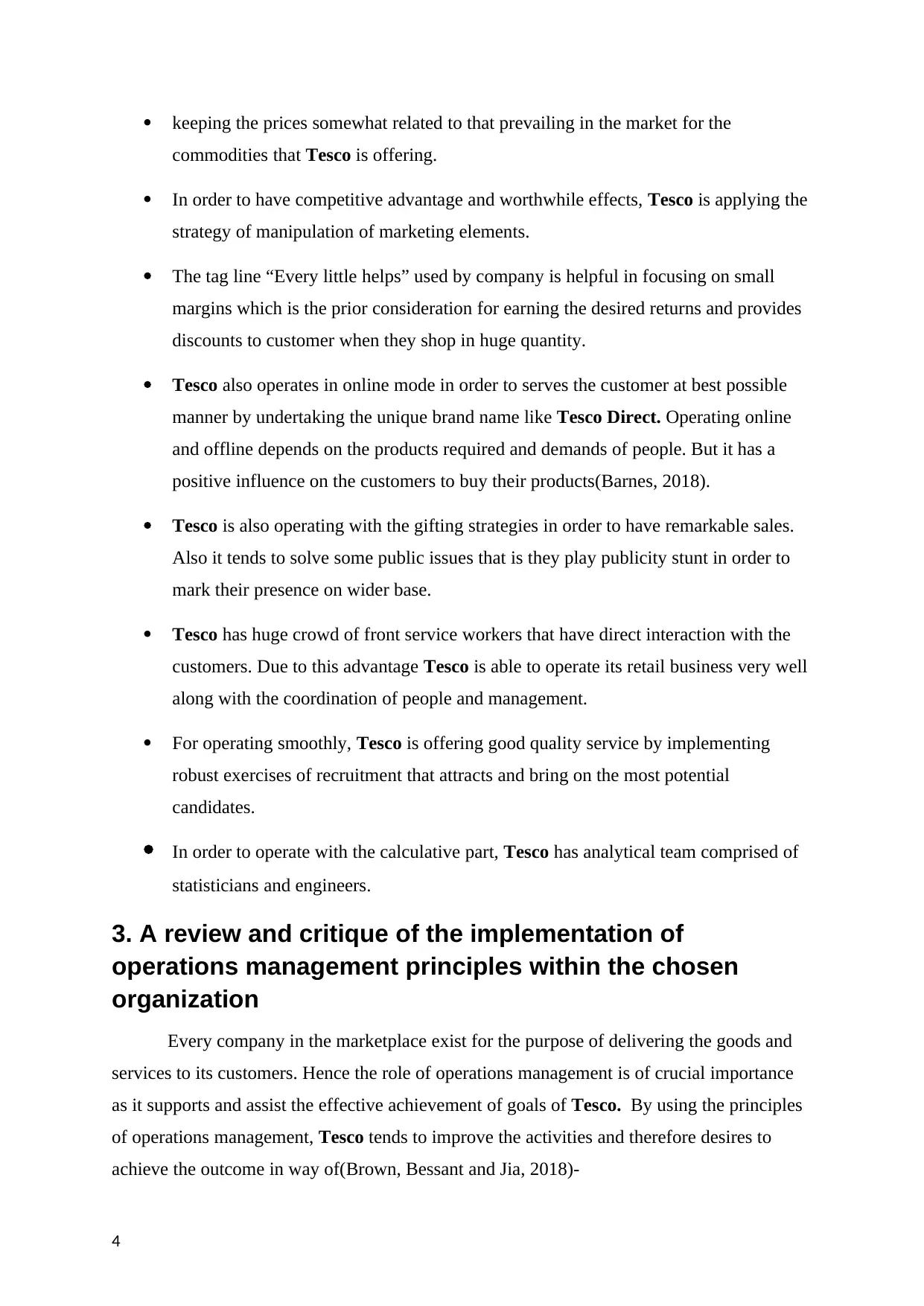
keeping the prices somewhat related to that prevailing in the market for the
commodities that Tesco is offering.
In order to have competitive advantage and worthwhile effects, Tesco is applying the
strategy of manipulation of marketing elements.
The tag line “Every little helps” used by company is helpful in focusing on small
margins which is the prior consideration for earning the desired returns and provides
discounts to customer when they shop in huge quantity.
Tesco also operates in online mode in order to serves the customer at best possible
manner by undertaking the unique brand name like Tesco Direct. Operating online
and offline depends on the products required and demands of people. But it has a
positive influence on the customers to buy their products(Barnes, 2018).
Tesco is also operating with the gifting strategies in order to have remarkable sales.
Also it tends to solve some public issues that is they play publicity stunt in order to
mark their presence on wider base.
Tesco has huge crowd of front service workers that have direct interaction with the
customers. Due to this advantage Tesco is able to operate its retail business very well
along with the coordination of people and management.
For operating smoothly, Tesco is offering good quality service by implementing
robust exercises of recruitment that attracts and bring on the most potential
candidates.
In order to operate with the calculative part, Tesco has analytical team comprised of
statisticians and engineers.
3. A review and critique of the implementation of
operations management principles within the chosen
organization
Every company in the marketplace exist for the purpose of delivering the goods and
services to its customers. Hence the role of operations management is of crucial importance
as it supports and assist the effective achievement of goals of Tesco. By using the principles
of operations management, Tesco tends to improve the activities and therefore desires to
achieve the outcome in way of(Brown, Bessant and Jia, 2018)-
4
commodities that Tesco is offering.
In order to have competitive advantage and worthwhile effects, Tesco is applying the
strategy of manipulation of marketing elements.
The tag line “Every little helps” used by company is helpful in focusing on small
margins which is the prior consideration for earning the desired returns and provides
discounts to customer when they shop in huge quantity.
Tesco also operates in online mode in order to serves the customer at best possible
manner by undertaking the unique brand name like Tesco Direct. Operating online
and offline depends on the products required and demands of people. But it has a
positive influence on the customers to buy their products(Barnes, 2018).
Tesco is also operating with the gifting strategies in order to have remarkable sales.
Also it tends to solve some public issues that is they play publicity stunt in order to
mark their presence on wider base.
Tesco has huge crowd of front service workers that have direct interaction with the
customers. Due to this advantage Tesco is able to operate its retail business very well
along with the coordination of people and management.
For operating smoothly, Tesco is offering good quality service by implementing
robust exercises of recruitment that attracts and bring on the most potential
candidates.
In order to operate with the calculative part, Tesco has analytical team comprised of
statisticians and engineers.
3. A review and critique of the implementation of
operations management principles within the chosen
organization
Every company in the marketplace exist for the purpose of delivering the goods and
services to its customers. Hence the role of operations management is of crucial importance
as it supports and assist the effective achievement of goals of Tesco. By using the principles
of operations management, Tesco tends to improve the activities and therefore desires to
achieve the outcome in way of(Brown, Bessant and Jia, 2018)-
4
Paraphrase This Document
Need a fresh take? Get an instant paraphrase of this document with our AI Paraphraser
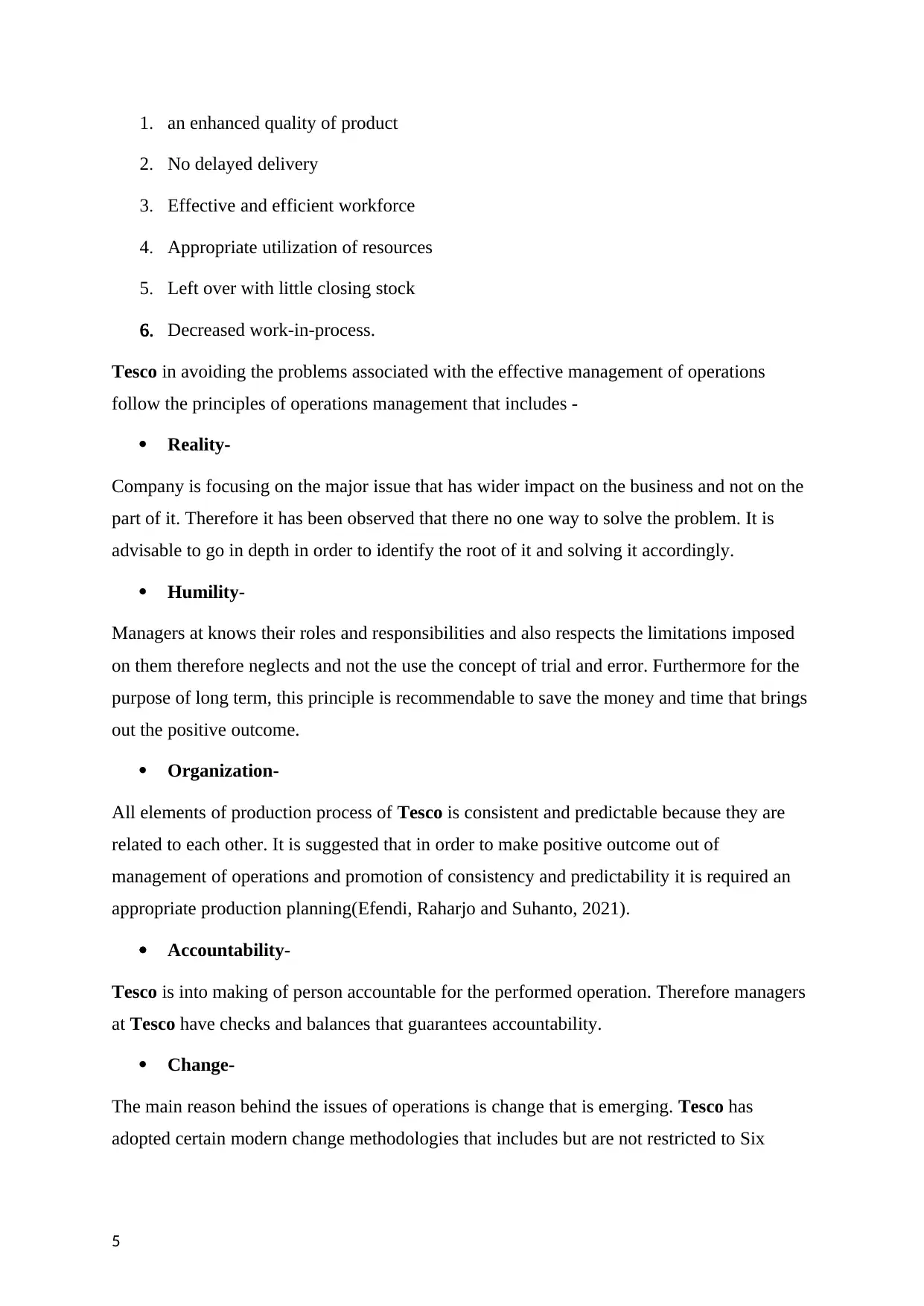
1. an enhanced quality of product
2. No delayed delivery
3. Effective and efficient workforce
4. Appropriate utilization of resources
5. Left over with little closing stock
6. Decreased work-in-process.
Tesco in avoiding the problems associated with the effective management of operations
follow the principles of operations management that includes -
Reality-
Company is focusing on the major issue that has wider impact on the business and not on the
part of it. Therefore it has been observed that there no one way to solve the problem. It is
advisable to go in depth in order to identify the root of it and solving it accordingly.
Humility-
Managers at knows their roles and responsibilities and also respects the limitations imposed
on them therefore neglects and not the use the concept of trial and error. Furthermore for the
purpose of long term, this principle is recommendable to save the money and time that brings
out the positive outcome.
Organization-
All elements of production process of Tesco is consistent and predictable because they are
related to each other. It is suggested that in order to make positive outcome out of
management of operations and promotion of consistency and predictability it is required an
appropriate production planning(Efendi, Raharjo and Suhanto, 2021).
Accountability-
Tesco is into making of person accountable for the performed operation. Therefore managers
at Tesco have checks and balances that guarantees accountability.
Change-
The main reason behind the issues of operations is change that is emerging. Tesco has
adopted certain modern change methodologies that includes but are not restricted to Six
5
2. No delayed delivery
3. Effective and efficient workforce
4. Appropriate utilization of resources
5. Left over with little closing stock
6. Decreased work-in-process.
Tesco in avoiding the problems associated with the effective management of operations
follow the principles of operations management that includes -
Reality-
Company is focusing on the major issue that has wider impact on the business and not on the
part of it. Therefore it has been observed that there no one way to solve the problem. It is
advisable to go in depth in order to identify the root of it and solving it accordingly.
Humility-
Managers at knows their roles and responsibilities and also respects the limitations imposed
on them therefore neglects and not the use the concept of trial and error. Furthermore for the
purpose of long term, this principle is recommendable to save the money and time that brings
out the positive outcome.
Organization-
All elements of production process of Tesco is consistent and predictable because they are
related to each other. It is suggested that in order to make positive outcome out of
management of operations and promotion of consistency and predictability it is required an
appropriate production planning(Efendi, Raharjo and Suhanto, 2021).
Accountability-
Tesco is into making of person accountable for the performed operation. Therefore managers
at Tesco have checks and balances that guarantees accountability.
Change-
The main reason behind the issues of operations is change that is emerging. Tesco has
adopted certain modern change methodologies that includes but are not restricted to Six
5
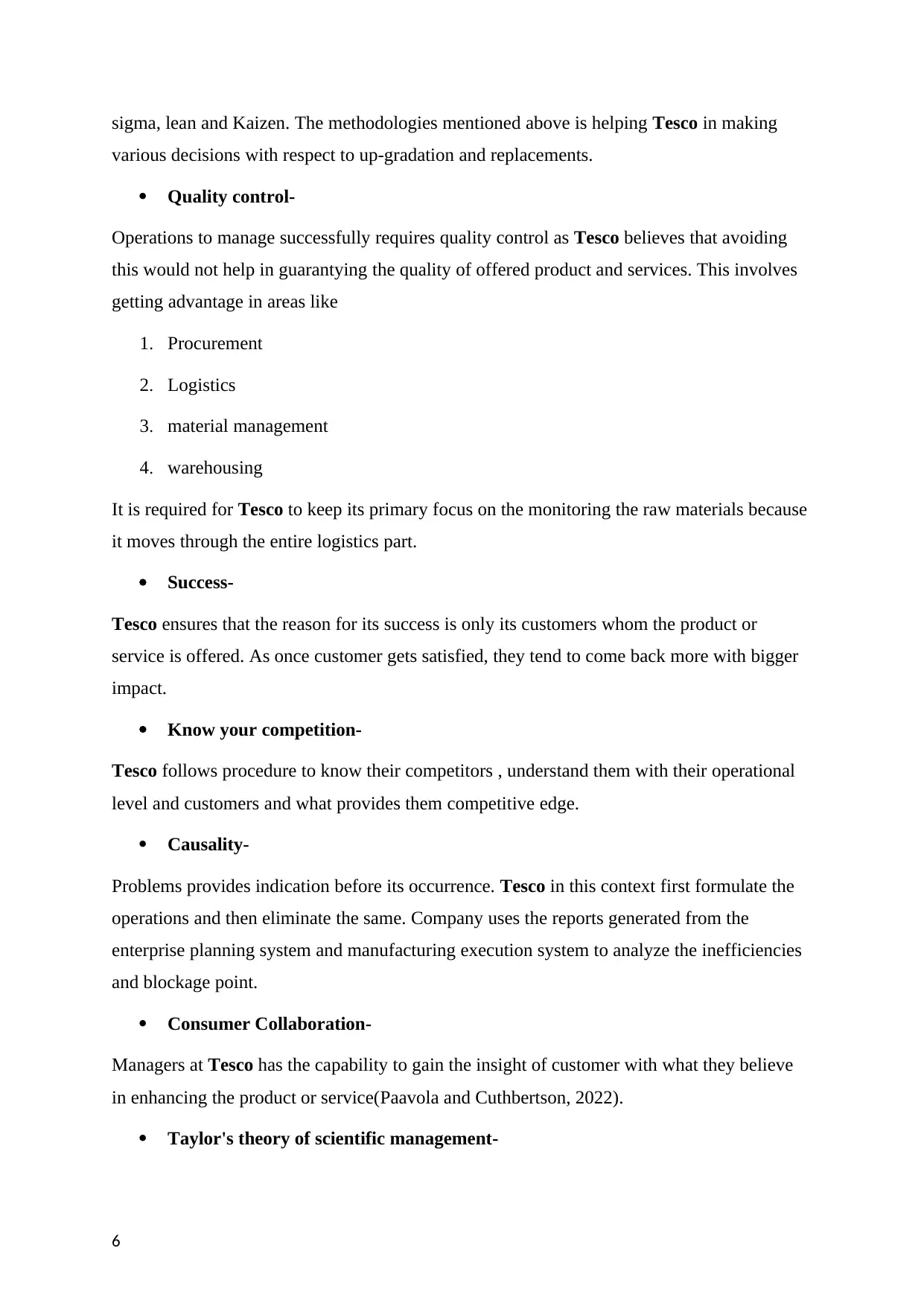
sigma, lean and Kaizen. The methodologies mentioned above is helping Tesco in making
various decisions with respect to up-gradation and replacements.
Quality control-
Operations to manage successfully requires quality control as Tesco believes that avoiding
this would not help in guarantying the quality of offered product and services. This involves
getting advantage in areas like
1. Procurement
2. Logistics
3. material management
4. warehousing
It is required for Tesco to keep its primary focus on the monitoring the raw materials because
it moves through the entire logistics part.
Success-
Tesco ensures that the reason for its success is only its customers whom the product or
service is offered. As once customer gets satisfied, they tend to come back more with bigger
impact.
Know your competition-
Tesco follows procedure to know their competitors , understand them with their operational
level and customers and what provides them competitive edge.
Causality-
Problems provides indication before its occurrence. Tesco in this context first formulate the
operations and then eliminate the same. Company uses the reports generated from the
enterprise planning system and manufacturing execution system to analyze the inefficiencies
and blockage point.
Consumer Collaboration-
Managers at Tesco has the capability to gain the insight of customer with what they believe
in enhancing the product or service(Paavola and Cuthbertson, 2022).
Taylor's theory of scientific management-
6
various decisions with respect to up-gradation and replacements.
Quality control-
Operations to manage successfully requires quality control as Tesco believes that avoiding
this would not help in guarantying the quality of offered product and services. This involves
getting advantage in areas like
1. Procurement
2. Logistics
3. material management
4. warehousing
It is required for Tesco to keep its primary focus on the monitoring the raw materials because
it moves through the entire logistics part.
Success-
Tesco ensures that the reason for its success is only its customers whom the product or
service is offered. As once customer gets satisfied, they tend to come back more with bigger
impact.
Know your competition-
Tesco follows procedure to know their competitors , understand them with their operational
level and customers and what provides them competitive edge.
Causality-
Problems provides indication before its occurrence. Tesco in this context first formulate the
operations and then eliminate the same. Company uses the reports generated from the
enterprise planning system and manufacturing execution system to analyze the inefficiencies
and blockage point.
Consumer Collaboration-
Managers at Tesco has the capability to gain the insight of customer with what they believe
in enhancing the product or service(Paavola and Cuthbertson, 2022).
Taylor's theory of scientific management-
6
⊘ This is a preview!⊘
Do you want full access?
Subscribe today to unlock all pages.

Trusted by 1+ million students worldwide
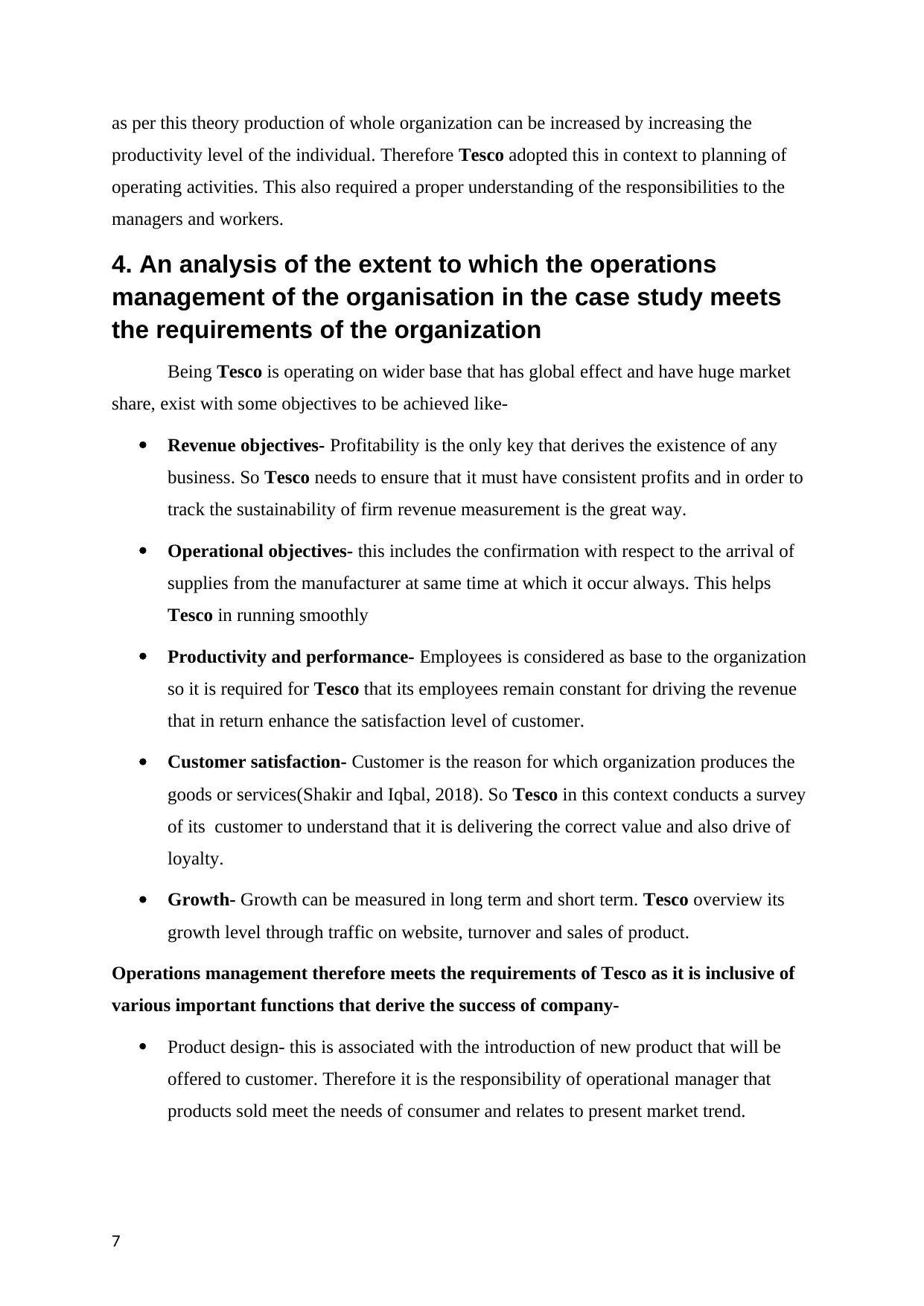
as per this theory production of whole organization can be increased by increasing the
productivity level of the individual. Therefore Tesco adopted this in context to planning of
operating activities. This also required a proper understanding of the responsibilities to the
managers and workers.
4. An analysis of the extent to which the operations
management of the organisation in the case study meets
the requirements of the organization
Being Tesco is operating on wider base that has global effect and have huge market
share, exist with some objectives to be achieved like-
Revenue objectives- Profitability is the only key that derives the existence of any
business. So Tesco needs to ensure that it must have consistent profits and in order to
track the sustainability of firm revenue measurement is the great way.
Operational objectives- this includes the confirmation with respect to the arrival of
supplies from the manufacturer at same time at which it occur always. This helps
Tesco in running smoothly
Productivity and performance- Employees is considered as base to the organization
so it is required for Tesco that its employees remain constant for driving the revenue
that in return enhance the satisfaction level of customer.
Customer satisfaction- Customer is the reason for which organization produces the
goods or services(Shakir and Iqbal, 2018). So Tesco in this context conducts a survey
of its customer to understand that it is delivering the correct value and also drive of
loyalty.
Growth- Growth can be measured in long term and short term. Tesco overview its
growth level through traffic on website, turnover and sales of product.
Operations management therefore meets the requirements of Tesco as it is inclusive of
various important functions that derive the success of company-
Product design- this is associated with the introduction of new product that will be
offered to customer. Therefore it is the responsibility of operational manager that
products sold meet the needs of consumer and relates to present market trend.
7
productivity level of the individual. Therefore Tesco adopted this in context to planning of
operating activities. This also required a proper understanding of the responsibilities to the
managers and workers.
4. An analysis of the extent to which the operations
management of the organisation in the case study meets
the requirements of the organization
Being Tesco is operating on wider base that has global effect and have huge market
share, exist with some objectives to be achieved like-
Revenue objectives- Profitability is the only key that derives the existence of any
business. So Tesco needs to ensure that it must have consistent profits and in order to
track the sustainability of firm revenue measurement is the great way.
Operational objectives- this includes the confirmation with respect to the arrival of
supplies from the manufacturer at same time at which it occur always. This helps
Tesco in running smoothly
Productivity and performance- Employees is considered as base to the organization
so it is required for Tesco that its employees remain constant for driving the revenue
that in return enhance the satisfaction level of customer.
Customer satisfaction- Customer is the reason for which organization produces the
goods or services(Shakir and Iqbal, 2018). So Tesco in this context conducts a survey
of its customer to understand that it is delivering the correct value and also drive of
loyalty.
Growth- Growth can be measured in long term and short term. Tesco overview its
growth level through traffic on website, turnover and sales of product.
Operations management therefore meets the requirements of Tesco as it is inclusive of
various important functions that derive the success of company-
Product design- this is associated with the introduction of new product that will be
offered to customer. Therefore it is the responsibility of operational manager that
products sold meet the needs of consumer and relates to present market trend.
7
Paraphrase This Document
Need a fresh take? Get an instant paraphrase of this document with our AI Paraphraser
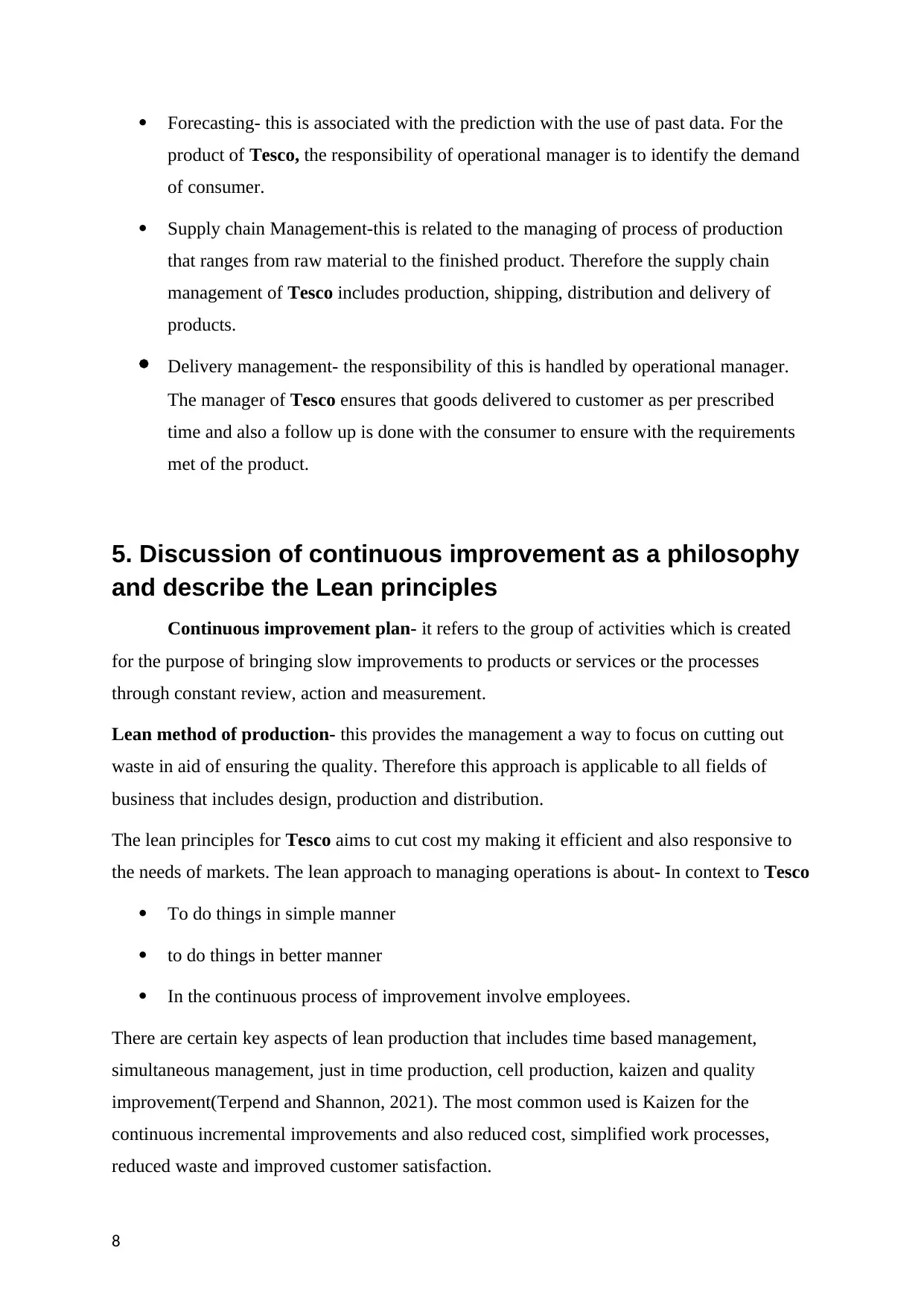
Forecasting- this is associated with the prediction with the use of past data. For the
product of Tesco, the responsibility of operational manager is to identify the demand
of consumer.
Supply chain Management-this is related to the managing of process of production
that ranges from raw material to the finished product. Therefore the supply chain
management of Tesco includes production, shipping, distribution and delivery of
products.
Delivery management- the responsibility of this is handled by operational manager.
The manager of Tesco ensures that goods delivered to customer as per prescribed
time and also a follow up is done with the consumer to ensure with the requirements
met of the product.
5. Discussion of continuous improvement as a philosophy
and describe the Lean principles
Continuous improvement plan- it refers to the group of activities which is created
for the purpose of bringing slow improvements to products or services or the processes
through constant review, action and measurement.
Lean method of production- this provides the management a way to focus on cutting out
waste in aid of ensuring the quality. Therefore this approach is applicable to all fields of
business that includes design, production and distribution.
The lean principles for Tesco aims to cut cost my making it efficient and also responsive to
the needs of markets. The lean approach to managing operations is about- In context to Tesco
To do things in simple manner
to do things in better manner
In the continuous process of improvement involve employees.
There are certain key aspects of lean production that includes time based management,
simultaneous management, just in time production, cell production, kaizen and quality
improvement(Terpend and Shannon, 2021). The most common used is Kaizen for the
continuous incremental improvements and also reduced cost, simplified work processes,
reduced waste and improved customer satisfaction.
8
product of Tesco, the responsibility of operational manager is to identify the demand
of consumer.
Supply chain Management-this is related to the managing of process of production
that ranges from raw material to the finished product. Therefore the supply chain
management of Tesco includes production, shipping, distribution and delivery of
products.
Delivery management- the responsibility of this is handled by operational manager.
The manager of Tesco ensures that goods delivered to customer as per prescribed
time and also a follow up is done with the consumer to ensure with the requirements
met of the product.
5. Discussion of continuous improvement as a philosophy
and describe the Lean principles
Continuous improvement plan- it refers to the group of activities which is created
for the purpose of bringing slow improvements to products or services or the processes
through constant review, action and measurement.
Lean method of production- this provides the management a way to focus on cutting out
waste in aid of ensuring the quality. Therefore this approach is applicable to all fields of
business that includes design, production and distribution.
The lean principles for Tesco aims to cut cost my making it efficient and also responsive to
the needs of markets. The lean approach to managing operations is about- In context to Tesco
To do things in simple manner
to do things in better manner
In the continuous process of improvement involve employees.
There are certain key aspects of lean production that includes time based management,
simultaneous management, just in time production, cell production, kaizen and quality
improvement(Terpend and Shannon, 2021). The most common used is Kaizen for the
continuous incremental improvements and also reduced cost, simplified work processes,
reduced waste and improved customer satisfaction.
8
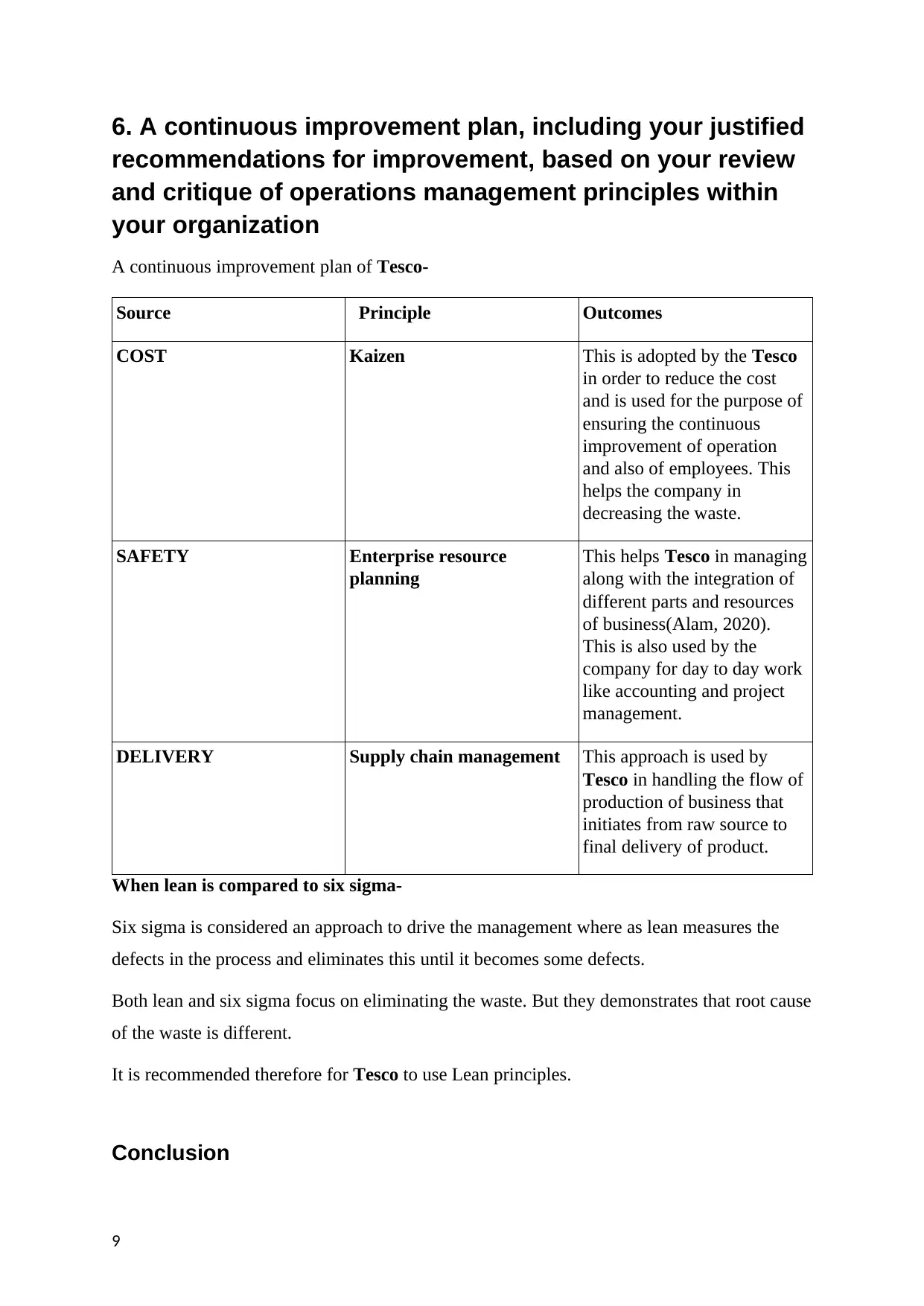
6. A continuous improvement plan, including your justified
recommendations for improvement, based on your review
and critique of operations management principles within
your organization
A continuous improvement plan of Tesco-
Source Principle Outcomes
COST Kaizen This is adopted by the Tesco
in order to reduce the cost
and is used for the purpose of
ensuring the continuous
improvement of operation
and also of employees. This
helps the company in
decreasing the waste.
SAFETY Enterprise resource
planning
This helps Tesco in managing
along with the integration of
different parts and resources
of business(Alam, 2020).
This is also used by the
company for day to day work
like accounting and project
management.
DELIVERY Supply chain management This approach is used by
Tesco in handling the flow of
production of business that
initiates from raw source to
final delivery of product.
When lean is compared to six sigma-
Six sigma is considered an approach to drive the management where as lean measures the
defects in the process and eliminates this until it becomes some defects.
Both lean and six sigma focus on eliminating the waste. But they demonstrates that root cause
of the waste is different.
It is recommended therefore for Tesco to use Lean principles.
Conclusion
9
recommendations for improvement, based on your review
and critique of operations management principles within
your organization
A continuous improvement plan of Tesco-
Source Principle Outcomes
COST Kaizen This is adopted by the Tesco
in order to reduce the cost
and is used for the purpose of
ensuring the continuous
improvement of operation
and also of employees. This
helps the company in
decreasing the waste.
SAFETY Enterprise resource
planning
This helps Tesco in managing
along with the integration of
different parts and resources
of business(Alam, 2020).
This is also used by the
company for day to day work
like accounting and project
management.
DELIVERY Supply chain management This approach is used by
Tesco in handling the flow of
production of business that
initiates from raw source to
final delivery of product.
When lean is compared to six sigma-
Six sigma is considered an approach to drive the management where as lean measures the
defects in the process and eliminates this until it becomes some defects.
Both lean and six sigma focus on eliminating the waste. But they demonstrates that root cause
of the waste is different.
It is recommended therefore for Tesco to use Lean principles.
Conclusion
9
⊘ This is a preview!⊘
Do you want full access?
Subscribe today to unlock all pages.

Trusted by 1+ million students worldwide
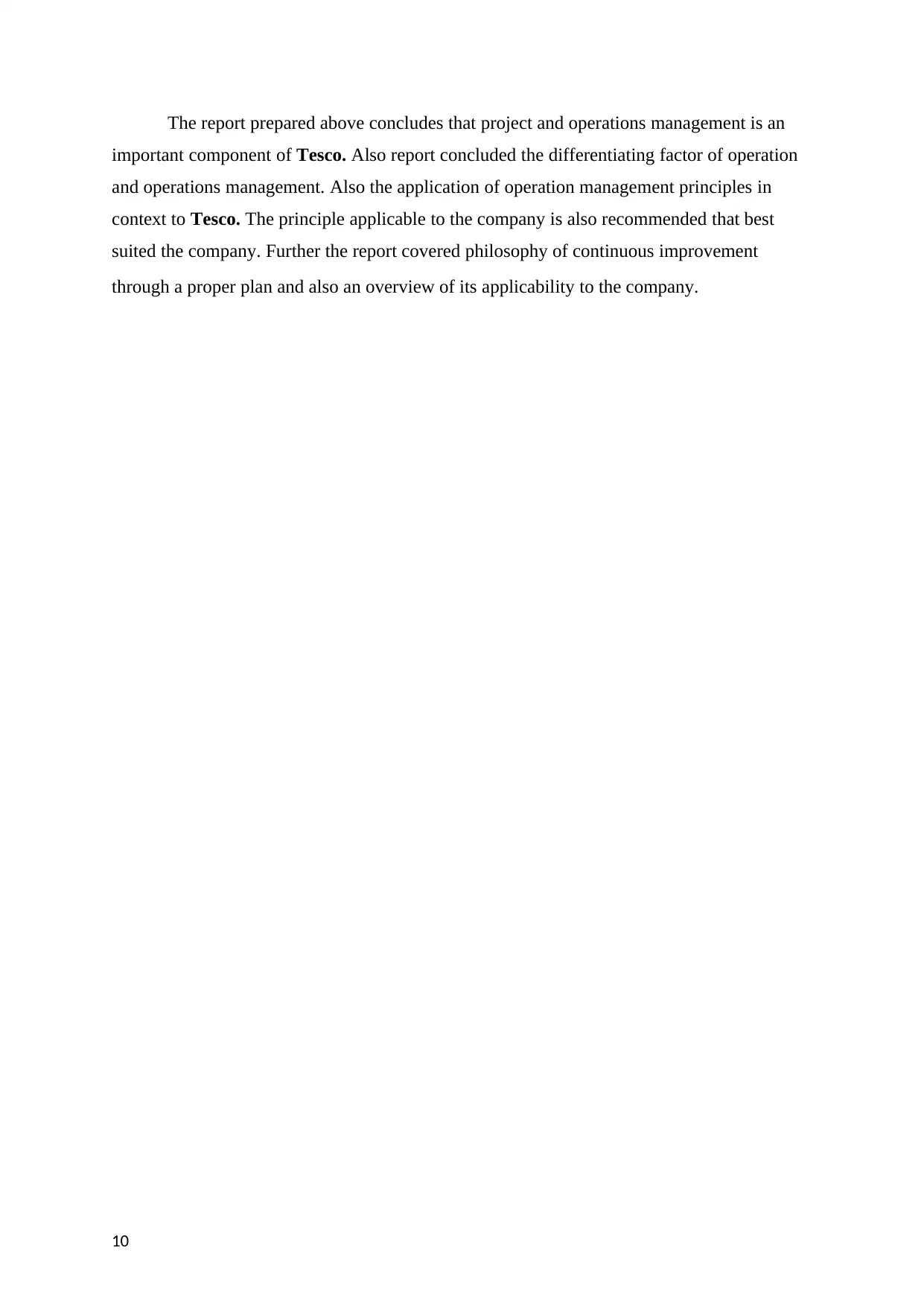
The report prepared above concludes that project and operations management is an
important component of Tesco. Also report concluded the differentiating factor of operation
and operations management. Also the application of operation management principles in
context to Tesco. The principle applicable to the company is also recommended that best
suited the company. Further the report covered philosophy of continuous improvement
through a proper plan and also an overview of its applicability to the company.
10
important component of Tesco. Also report concluded the differentiating factor of operation
and operations management. Also the application of operation management principles in
context to Tesco. The principle applicable to the company is also recommended that best
suited the company. Further the report covered philosophy of continuous improvement
through a proper plan and also an overview of its applicability to the company.
10
Paraphrase This Document
Need a fresh take? Get an instant paraphrase of this document with our AI Paraphraser
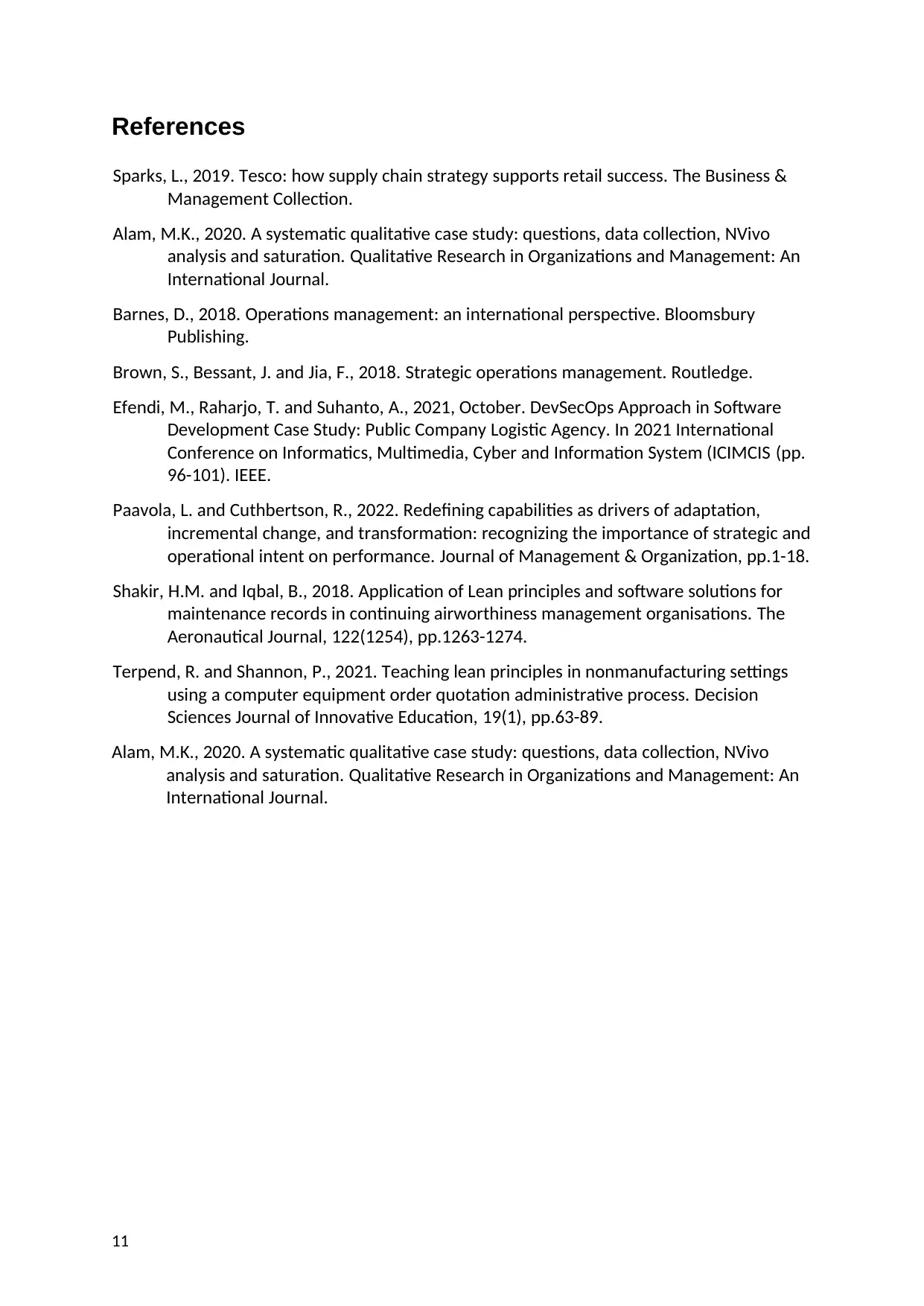
References
Sparks, L., 2019. Tesco: how supply chain strategy supports retail success. The Business &
Management Collection.
Alam, M.K., 2020. A systematic qualitative case study: questions, data collection, NVivo
analysis and saturation. Qualitative Research in Organizations and Management: An
International Journal.
Barnes, D., 2018. Operations management: an international perspective. Bloomsbury
Publishing.
Brown, S., Bessant, J. and Jia, F., 2018. Strategic operations management. Routledge.
Efendi, M., Raharjo, T. and Suhanto, A., 2021, October. DevSecOps Approach in Software
Development Case Study: Public Company Logistic Agency. In 2021 International
Conference on Informatics, Multimedia, Cyber and Information System (ICIMCIS (pp.
96-101). IEEE.
Paavola, L. and Cuthbertson, R., 2022. Redefining capabilities as drivers of adaptation,
incremental change, and transformation: recognizing the importance of strategic and
operational intent on performance. Journal of Management & Organization, pp.1-18.
Shakir, H.M. and Iqbal, B., 2018. Application of Lean principles and software solutions for
maintenance records in continuing airworthiness management organisations. The
Aeronautical Journal, 122(1254), pp.1263-1274.
Terpend, R. and Shannon, P., 2021. Teaching lean principles in nonmanufacturing settings
using a computer equipment order quotation administrative process. Decision
Sciences Journal of Innovative Education, 19(1), pp.63-89.
Alam, M.K., 2020. A systematic qualitative case study: questions, data collection, NVivo
analysis and saturation. Qualitative Research in Organizations and Management: An
International Journal.
11
Sparks, L., 2019. Tesco: how supply chain strategy supports retail success. The Business &
Management Collection.
Alam, M.K., 2020. A systematic qualitative case study: questions, data collection, NVivo
analysis and saturation. Qualitative Research in Organizations and Management: An
International Journal.
Barnes, D., 2018. Operations management: an international perspective. Bloomsbury
Publishing.
Brown, S., Bessant, J. and Jia, F., 2018. Strategic operations management. Routledge.
Efendi, M., Raharjo, T. and Suhanto, A., 2021, October. DevSecOps Approach in Software
Development Case Study: Public Company Logistic Agency. In 2021 International
Conference on Informatics, Multimedia, Cyber and Information System (ICIMCIS (pp.
96-101). IEEE.
Paavola, L. and Cuthbertson, R., 2022. Redefining capabilities as drivers of adaptation,
incremental change, and transformation: recognizing the importance of strategic and
operational intent on performance. Journal of Management & Organization, pp.1-18.
Shakir, H.M. and Iqbal, B., 2018. Application of Lean principles and software solutions for
maintenance records in continuing airworthiness management organisations. The
Aeronautical Journal, 122(1254), pp.1263-1274.
Terpend, R. and Shannon, P., 2021. Teaching lean principles in nonmanufacturing settings
using a computer equipment order quotation administrative process. Decision
Sciences Journal of Innovative Education, 19(1), pp.63-89.
Alam, M.K., 2020. A systematic qualitative case study: questions, data collection, NVivo
analysis and saturation. Qualitative Research in Organizations and Management: An
International Journal.
11
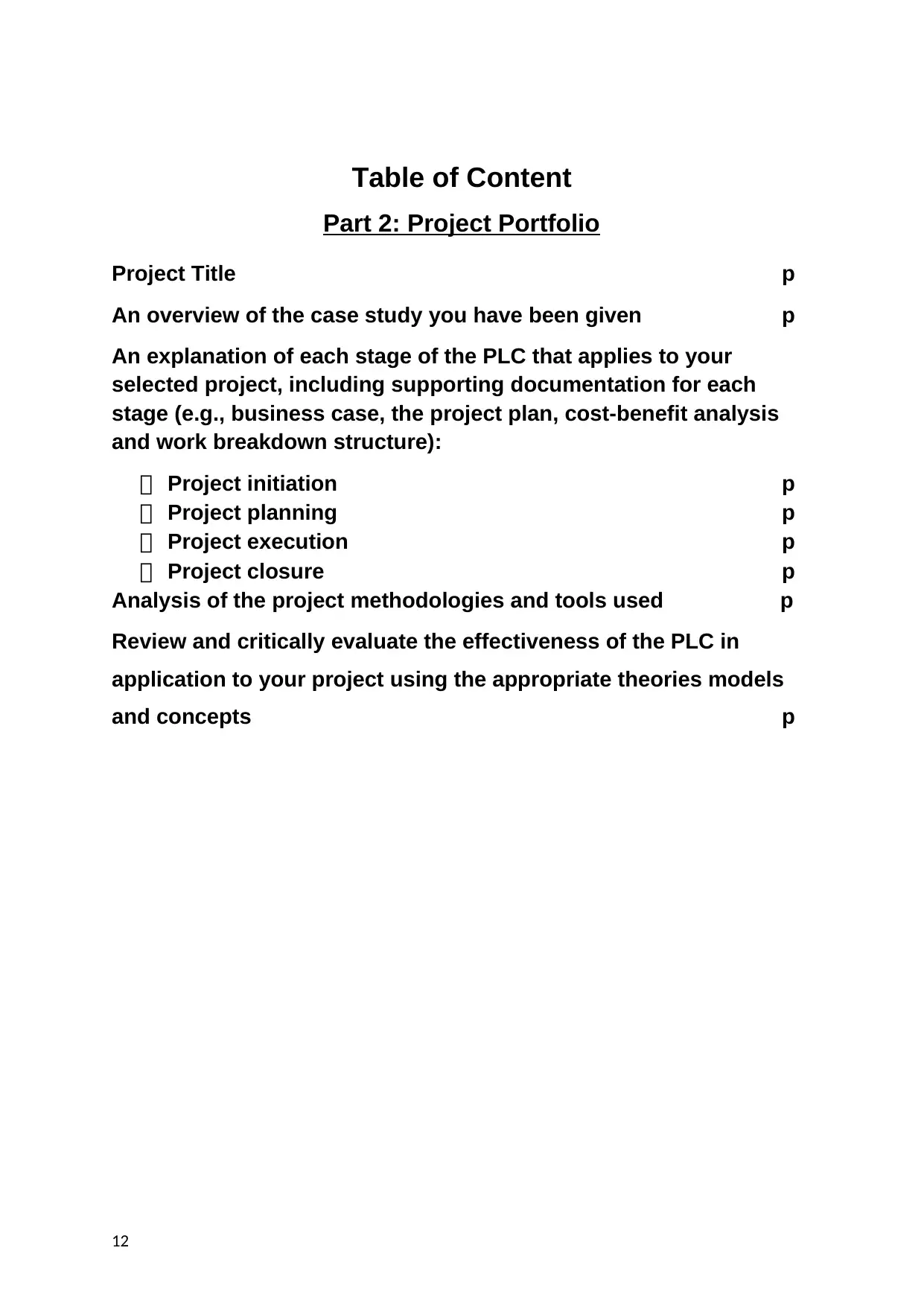
Table of Content
Part 2: Project Portfolio
Project Title p
An overview of the case study you have been given p
An explanation of each stage of the PLC that applies to your
selected project, including supporting documentation for each
stage (e.g., business case, the project plan, cost-benefit analysis
and work breakdown structure):
Project initiation p
Project planning p
Project execution p
Project closure p
Analysis of the project methodologies and tools used p
Review and critically evaluate the effectiveness of the PLC in
application to your project using the appropriate theories models
and concepts p
12
Part 2: Project Portfolio
Project Title p
An overview of the case study you have been given p
An explanation of each stage of the PLC that applies to your
selected project, including supporting documentation for each
stage (e.g., business case, the project plan, cost-benefit analysis
and work breakdown structure):
Project initiation p
Project planning p
Project execution p
Project closure p
Analysis of the project methodologies and tools used p
Review and critically evaluate the effectiveness of the PLC in
application to your project using the appropriate theories models
and concepts p
12
⊘ This is a preview!⊘
Do you want full access?
Subscribe today to unlock all pages.

Trusted by 1+ million students worldwide
1 out of 18
Related Documents
Your All-in-One AI-Powered Toolkit for Academic Success.
+13062052269
info@desklib.com
Available 24*7 on WhatsApp / Email
![[object Object]](/_next/static/media/star-bottom.7253800d.svg)
Unlock your academic potential
Copyright © 2020–2026 A2Z Services. All Rights Reserved. Developed and managed by ZUCOL.

